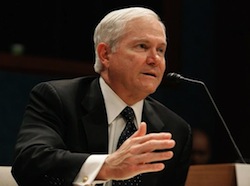Gates Talks to Senate Republicans About the Merits of NEW START
July 14, 2010
Featured Image
Today's top nuclear policy stories, with excerpts in bullet form.
Stories we're following today, Wednesday, July 14, 2010:
Obama sends Robert Gates to a 2012 Proxy Fight with Mitt Romney - The Hill [link]
- President Obama used Defense Secretary Robert Gates on Tuesday for a stealth attack on Mitt Romney, a leading Republican presidential contender in 2012.
- Obama dispatched Gates to meet Senate Republicans to discuss a U.S.-Russia nuclear arms treaty and other national security issues.
- Gates has helped slow GOP opposition from coalescing. So far, Senate Republicans haven’t followed Romney’s call to scrap the treaty. They held their fire after hearing from Gates in a lunchtime meeting off the Senate floor.
- “We do have some concerns, particularly with missile defense,” said Sen. Roger Wicker (R-Miss.), a Foreign Relations Committee member who is studying the treaty, “but it’s entirely possible a number of Republicans will support it when it’s all said and done."
- A GOP aide said Kyl has held several meetings with Biden to work out a possible agreement.
Will GOP Senators Flip Flop On START? - Max Bergmann in the Wonk Room [link]
- For New START to get ratified, all that is needed is for the Republican Senators that voted for the initial treaty the first time around to vote for it again.
- Eight current Republicans and one independent voted for the original START treaty. Republican Sens. Mitch McConnell, John McCain, Richard Lugar, Orrin Hatch, Chuck Grassley, Kit Bond, and Thad Cochran all voted for the START treaty in 1992. Joseph Lieberman and Richard Shelby both Democrats at the time also voted for the treaty.
- Now, one could say that a lot has changed since the early 1990s. But when it comes to arms-control and US-Russia nuclear relations whatever has changed since 1992 has changed for the better.
- Since it is clear that the original START treaty helped lay the basis for nuclear stability between the US and Russia for nearly two decades, these Senators should in fact be more confident in voting for New START than they were in the 1990s.
- Should these Senators oppose START, it isn’t because the treaty has changed, it is because they and their politics have changed.
- Not only would their opposition further demonstrate the conservative moment’s massive shift to the right, but it would also indicate a willingness by these nine Senators to put politics above the security of the country.
Fewer Nukes, More Cash: Energy Dep’t Wants $175 Billion for Weapons Complex - Wired Danger Room [link]
- President Obama says he wants a “world without nuclear weapons.” But his Department of Energy may not be so persuaded.
- It’s prepping for a future where the U.S. keeps double the amount of nuclear weapons a new treaty permits — and at higher cost-per-nuke than it currently spends to maintain its arsenal.
- Crunching the plan’s numbers, the Federation of American Scientists finds that the Energy Department will go from spending over $6 billion now to maintain a stockpile of 5,000 warheads to spending about $9 billion by 2017 — for maintaining an envisioned stockpile of only up to 3,500 warheads.
- Add to that $175 billion over 20 years to build new weapons factories, simulation facilities and modernization equipment.
- All of which strikes the Federation’s Hans Kristensen as “miscalculation and overreach” by the Energy Department. He expressed hope that Congress will “look more closely at how they reach these numbers."
- NOTE: The report was obtained and published by the Union of Concerned Scientists and the Federation of American Scientists, both Ploughshares Fund grantees.
New START: The Big Picture - James Acton for the Carnegie Endowment for International Peace [link]
- Naturally, Jon Kyl's Wall Street Journal op-ed took a few cursory potshots at the New START treaty's text itself, including at its verification regime.
- But, maybe he realized that his 2003 vote for the Moscow Treaty—a treaty that contains no verification provisions whatsoever—reduced his credibility on this subject because, by and large, he stayed clear of discussing the treaty on its merits.
- Good relations with Russia are in the American national interest. Rejection of New START would deal them a devastating blow.
- President Obama has made it clear that any future arms control treaty with Russia must include tactical nuclear weapons. By Kyl’s own logic, pursuit of such a treaty is a laudable goal. However, there is no chance of negotiating one, if the United States does not ratify New START.
- Ratifying New START, with its modest, verifiable reductions that do not raise hard questions about the adequacy of the U.S. deterrent, is the first order of business.
A View from the Dark Side
A Welcome Debate: A Week of START Op-Eds - The Heritage Foundation's Foundry blog [link]
- In a week dominated by new START op-eds, Senator Richard Lugar (R-IN) penned another piece supporting treaty ratification while rejecting the arguments of former Governor Mitt Romney (R-MA) from earlier this week.
- Getting down to the sheer facts of the matter make it clear that opposing the New START treaty is simply in the best interest of United States security.
- Overall, nothing in this treaty prevents Russia from neither building upon its capabilities nor increasing the size of its tactical weapons arsenal. This is what makes Sen. Lugar’s comment that they treaty will limit potential arms competition puzzling.
- This treaty solidifies Russia’s role as a dominant nuclear power by putting the Russian arsenal on par with ours. It was a classic example of nuclear diplomacy and will only lead to Russia seeking further concessions down the road.
- It is imperative that this treaty is looked at as something more than an arms control document. Once that is done, it will become clear why this treaty is wrong for the U.S.



